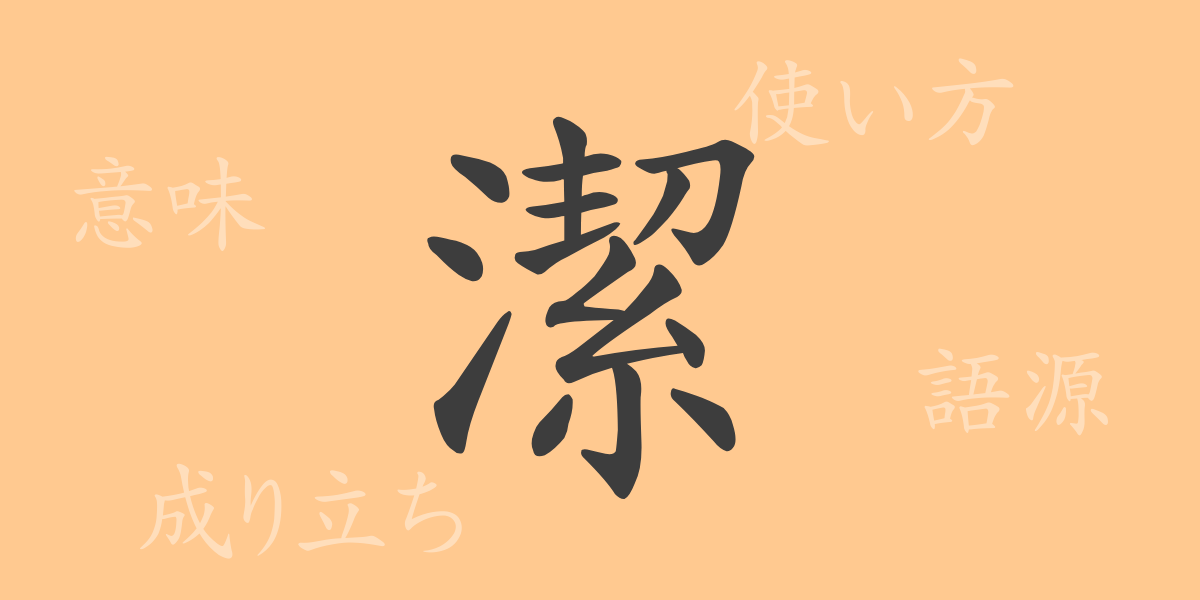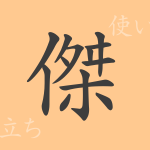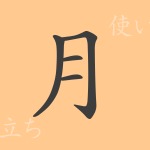In the Japanese language, many kanji characters carry deep meanings with just one character. “潔” (いさぎよい, isagiyoi) is one such character that plays a significant role in our daily lives and culture. This article explores the origins, modern usage, idioms, and proverbs involving “潔” (いさぎよい, isagiyoi), highlighting its charm and enhancing your vocabulary while offering a glimpse into the beauty of the Japanese language.
Origin of 潔
The kanji “潔” (いさぎよい, isagiyoi) consists of “氵” (さんずい, sanzui), which means water, and “疌,” which signifies cleansing a disease. This combination leads to the meanings of “purifying” or “removing impurities,” and it further evolved to signify “cleanliness of mind and body.” In Japanese culture, which has long valued both physical cleanliness and moral and spiritual purity, this kanji represents an important concept.
Meaning and Usage of 潔
“潔” (いさぎよい, isagiyoi) means “clean” or “pure,” carrying nuances of clarity and the elimination of unnecessary elements. In Japanese, it is often used as an adjective to describe people’s actions or feelings, such as in “潔い断り方” (いさぎよいことわりかた, isagiyoi kotowarikata, a straightforward refusal) or “潔く負けを認める” (いさぎよくまけをみとめる, isagiyoku make wo mitomeru, to accept defeat gracefully). It is also used to describe staying true to one’s beliefs.
Readings, Stroke Count, and Radical of 潔
The kanji “潔” (いさぎよい, isagiyoi) is a common character in Japanese, and its readings and components are as follows:
- Reading: The on’yomi (音読み) is “ケツ” (けつ, ketsu), and the kun’yomi (訓読み) is “いさぎよい” (いさぎよい, isagiyoi).
- Stroke count: It has a total of 15 strokes.
- Radical: The radical is “氵” (さんずい, sanzui), categorizing it among kanji related to water.
Idioms, Proverbs, and Phrases Using 潔
Idioms, proverbs, and phrases that include “潔” (いさぎよい, isagiyoi) express its depth of meaning in various contexts. Here are a few examples:
- 潔白 (けっぱく, keppaku): Innocence or purity, being free from guilt or impurities.
- 潔斎 (けっさい, kessai): Purification of mind and body, especially before a religious ceremony.
- 潔快 (けっかい, kekkai): Feeling refreshed and clear.
- 潔さっぱり (いさぎさっぱり, isagisappari): A straightforward, clean attitude without dwelling on things.
- 潔く染まる (いさぎよくそまる, isagiyoku somaru): Remaining pure without succumbing to bad habits or influences.
Conclusion About 潔
The world of “潔” (いさぎよい, isagiyoi) encapsulates the beauty and depth of the Japanese language. From maintaining physical cleanliness to keeping a pure heart and staying true to one’s beliefs, this character holds a broad range of meanings that are deeply integrated into our lives. Through the knowledge of “潔” (いさぎよい, isagiyoi), we can appreciate the tradition and culture of valuing purity that has been passed down through generations in Japan. We hope you enjoy the rich world of the Japanese language through this exploration of “潔” (いさぎよい, isagiyoi).

























